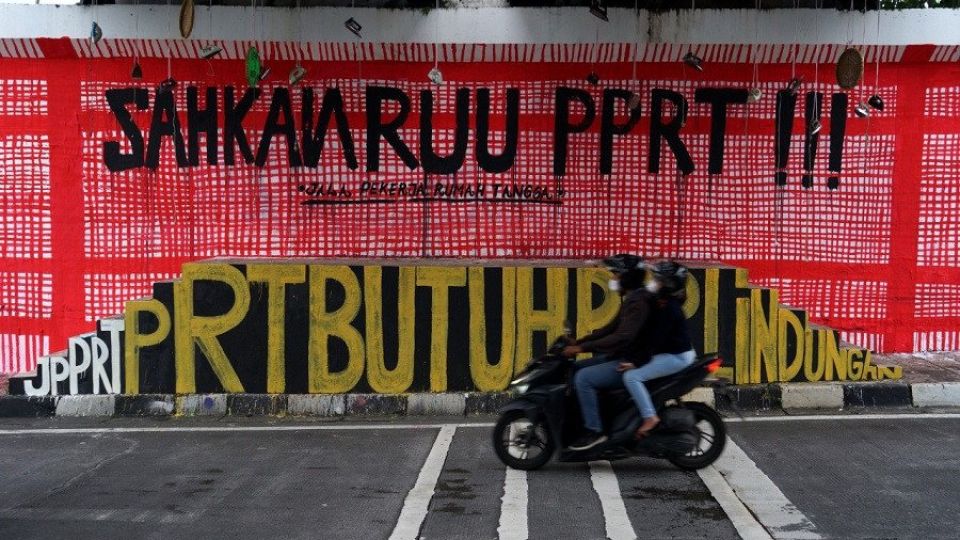January 25, 2023
JAKARTA – After nearly two decades languishing in the legislature, the domestic worker protection bill has been publicly endorsed by President Jokowi “Jokowi” Widodo, putting pressure on the House of Representatives to hasten its passage.
Jokowi appealed to the House on Wednesday to speed up deliberations on the bill as he pledged to provide better protections for the country’s 4 million domestic workers.
“I think it’s time for us to realize the domestic worker protection law,” the President said in a live-streamed press conference, noting that prevailing labor laws did not specifically address domestic workers.
“I and all ranks of the government are committed and striving to provide protection for domestic workers […]. It has been more than 19 years and the domestic worker protection bill has yet to be passed. I hope that it can soon be enacted and give better protections for domestic workers, employers and job agencies,” Jokowi added.
The President said he had assigned the Law and Human Rights Ministry and the Manpower Ministry to coordinate efforts with the House and other stakeholders to ensure the bill’s timely passage.
Civil groups have welcomed the President’s move and hope it will break the long legislative stalemate.
“Much respect and our deepest gratitude to the President for his firm and clear statement that the bill should be urgently finalized. This is just the beginning of what’s to come. We hope the House and the government can soon discuss the bill and find common ground that can be accepted by all,” activist Lita Anggraini of the National Network on Domestic Worker Advocacy (Jala PRT) said in a live-streamed press conference.
‘We are confident’
Eva Kusuma Sundari, director of the Sarinah Institute and coordinator of the coalition of civil groups advocating for domestic worker protection, told The Jakarta Post that the coalition hoped Jokowi’s endorsement would encourage the Indonesian Democratic Party of Struggle (PDI-P) and Golkar, which had both opposed the bill in the past, to lend their support for its enactment.
The coalition was optimistic, Eva added, that with Jokowi’s endorsement, the bill could be passed by Feb. 15 to serve as a gift for domestic workers on National Domestic Workers’ Day.
“If the bill is finalized and passed as the House initiative bill, we are confident, and this has been guaranteed by the deputy law and human rights minister, that the deliberation will be fast because the bill contains no penalties and the number of the articles is much less than the sexual violence bill,” Eva said, referring to another long-awaited bill that was passed in April.
The domestic worker protection bill was first proposed in 2004 to address issues of “discrimination, abuse and humiliation”. It has been added to and then removed from the Prolegnas at least three times over the past 19 years.
The House Legislation Body (Baleg) previously agreed to endorse the bill in a plenary session on July 1, 2020, with the support of the House.
However, the House Steering Committee (Bamus) declined to approve the endorsement, citing “administrative reasons”.
Foot-dragging
The PDI-P and the Golkar, the two biggest party factions in the House, have opposed the bill since its discussion by Baleg, with the PDI-P specifically requesting to delay the deliberation, a proposal that was joined by seven other party factions.
Now back on the Prolegnas, the bill has been placed under “new proposed bills”, indicating it will likely be discussed this year.
However, House Speaker Puan Maharani appears to be in no rush to move forward with the bill, saying on Thursday that the House had to ensure the “quality” of the eventual deliberation by first discussing the substance of the bill alongside inputs from the government, lawmakers and the public.
“We have priorities with certain bills in the Prolegnas. Since the beginning of this period, we have tried not to rush any deliberation, tried to prioritize quality over quantity and tried to receive as much public input [as possible],” said Puan, a member of the PDI-P.
Women’s Empowerment and Child Protection Minister Bintang Puspayoga said the bill had seen significant development and had accommodated recommendations from a number of stakeholders, including provisions for employers and employment agencies.
“It is not only related to discrimination and violence but also to wages and everything. The bill is extremely vital. It not only focuses on providing protection to domestic workers but also regulates [requirements for] employers and agencies,” she said.
Bintang expressed hope that the President’s public appeal would encourage all stakeholders to cooperate to speed up the bill’s passage.
“Hopefully this year we can give the best [protections] to our fellow domestic workers,” she said.


